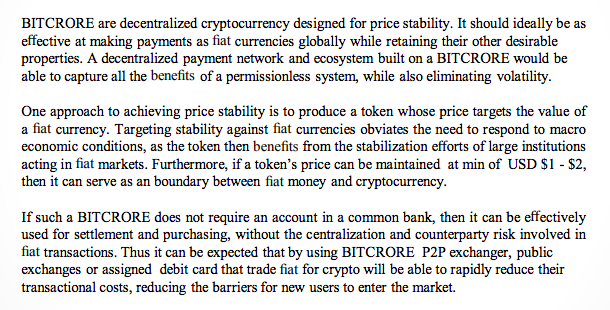Bitcrore is a project promising to bring to market a new stable coin, cryptocurrency marketplace, trading platform, and crypto debit card — among other things.
The Bitcrore website features all the parts you might expect from a legitimate ICO — even down to the fractal animation overused by the majority of low-quality initial coin offerings (ICOs) — albeit presented rather crudely, with visuals clearly hurriedly crafted by an amateur.
The Bitcrore project appears to be a shoddy amalgamation of several other projects, with its website featuring vague, incomplete descriptions of eight distinct components of the Bitcrore ecosystem — each of which could be a separate project in its own right.
On the whole, the website text appears thrown together haphazardly in an attempt to appear well-researched and convincing — but ultimately fails to deliver any substance or promote any sort of trust in the project.
Interestingly, the team behind this supposedly groundbreaking project built upon the Ethereum blockchain apparently has no concept of how to actually spell Ethereum.

The Evidence Mounts
Additionally, much of the project whitepaper is plagiarized from Synthetix, a project that allows users to mint synthetic versions of different cryptocurrencies to mediate the exchange of value between multiple blockchains. Synthetix is not the only project to have its content stolen, as Auctus, Hold and ProjectSmart also have parts of their whitepaper practically copy and pasted into the Bitcrore whitepaper — albeit with some minor adjustments relating to the Bitcrore specifics.
 As is the case with many scam projects, Bitcrore neglects to demonstrate the team behind the project, instead opting to describe how project management works and completely avoids describing the members of the Bitcrore team.
Despite this, however, Bitcrore is listed as a company on LinkedIn, with a claimed size of 50-200 employees — but only one anonymous freelancer is linked to the ‘company.’ At the very least, it is evident that a copywriter and graphics designer are not part of the team.
Trying their best to appear as legitimate as possible, the people behind the project have created a variety of social media and marketing profiles for the project, though most of these show little to no signs of life — very unusual for a project four months into its ICO and already on the fifth phase of its token sale.
The Bitcrore project is also listed on the Blockchain Summit Dubai website as an exhibitor and sponsor. This one-day exhibition, which took place on Nov 27, was filled with 20 exhibitors and 60 speakers. It appears that Bitcrore did actually attend the event, based on pictures supplied on the official project Telegram group.
As is the case with many scam projects, Bitcrore neglects to demonstrate the team behind the project, instead opting to describe how project management works and completely avoids describing the members of the Bitcrore team.
Despite this, however, Bitcrore is listed as a company on LinkedIn, with a claimed size of 50-200 employees — but only one anonymous freelancer is linked to the ‘company.’ At the very least, it is evident that a copywriter and graphics designer are not part of the team.
Trying their best to appear as legitimate as possible, the people behind the project have created a variety of social media and marketing profiles for the project, though most of these show little to no signs of life — very unusual for a project four months into its ICO and already on the fifth phase of its token sale.
The Bitcrore project is also listed on the Blockchain Summit Dubai website as an exhibitor and sponsor. This one-day exhibition, which took place on Nov 27, was filled with 20 exhibitors and 60 speakers. It appears that Bitcrore did actually attend the event, based on pictures supplied on the official project Telegram group.
 However, despite (albeit limited) evidence that they actually attended the event, it doesn’t appear that the project received much attention, as there appear to be zero relevant photos of the Bitcrore booth anywhere.
Whether or not Bitcrore is a scam remains to be seen, but the myriad warning signs and low-quality indicators likely make this project one to avoid — unless there are some drastic changes very quickly.
However, despite (albeit limited) evidence that they actually attended the event, it doesn’t appear that the project received much attention, as there appear to be zero relevant photos of the Bitcrore booth anywhere.
Whether or not Bitcrore is a scam remains to be seen, but the myriad warning signs and low-quality indicators likely make this project one to avoid — unless there are some drastic changes very quickly.
Scam or Not? How to Protect Yourself
For the most part, the large majority of ICOs have good intentions and are genuinely looking to bring a product to market that its users would be happy with. Although a significant proportion of ICOs is unnecessary or gimmicky, very few are outright scams. However, for the small minority of projects that are downright scams, there are a few simple steps you can take to minimize your risks of being caught out. The first and most important step is examining the project team. Are the team publicly displayed on the website along with their LinkedIn or other relevant profiles? Do they have the experience required to pull off the project? If the answer to either of these is ‘no,’ it would be wise to think twice about investing. The second step is to realistically examine the feasibility of the project. The majority of ICOs will promise the world in the project whitepaper and throughout the token sale, only to realize much later that the challenges are more difficult than first expected and are delivering a watered down version of the original idea — or, worse, nothing at all. Following these two steps, you can drastically reduce your risk of participating in a scam or shady ICO. For a more in-depth look at how to perform your due diligence for ICOs, check out our recent guide: How to Perform Due Diligence when Investing in Crypto ICOs. What are your thoughts on Bitcrore? Is it an outright scam or simply a low-budget project that cut one too many corners? Let us know in the comments below!
Top crypto platforms in the US
Disclaimer
In adherence to the Trust Project guidelines, BeInCrypto is committed to unbiased, transparent reporting. This news article aims to provide accurate, timely information. However, readers are advised to verify facts independently and consult with a professional before making any decisions based on this content. Please note that our Terms and Conditions, Privacy Policy, and Disclaimers have been updated.

Daniel Phillips
After obtaining a Masters degree in Regenerative Medicine, Daniel pivoted to the frontier field of blockchain technology, where he began to absorb anything and everything he could on the subject. Daniel has been bullish on Bitcoin since before it was cool, and continues to be so despite any evidence to the contrary. Nowadays, Daniel works in the blockchain space full time, as both a copywriter and blockchain marketer.
After obtaining a Masters degree in Regenerative Medicine, Daniel pivoted to the frontier field of blockchain technology, where he began to absorb anything and everything he could on the subject. Daniel has been bullish on Bitcoin since before it was cool, and continues to be so despite any evidence to the contrary. Nowadays, Daniel works in the blockchain space full time, as both a copywriter and blockchain marketer.
READ FULL BIO
Sponsored
Sponsored
